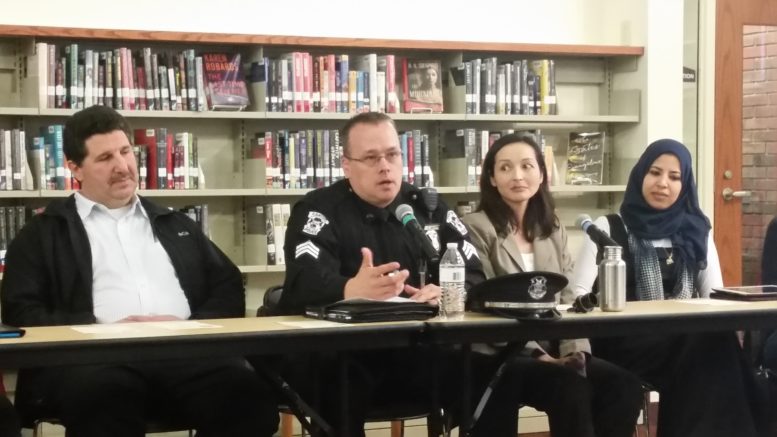By JAN LARSON McLAUGHLIN
BG Independent News
Gone unchallenged, fear can mutate into hatred. Whether shouted at a campaign stop, or whispered at a family dinner, hate speech gains credence if it’s not stopped in its tracks.
So those gathered for the Islamophobia discussion Tuesday were told to not remain silent when confronted with hatred. Tolerating talk that equates Islam to terrorism, Jihad to violence, and hatred as acceptable, only allows the fear to fester and spread.
“Challenge them,” said panel member Sgt. Dale Waltz, of the Canton Response to Hate Crimes Coalition in Michigan. “Pay attention to the whispering conversations. Shed some light and educate people.”
That includes everyone from national politicians spewing hatred from televised podiums, to family members spreading long-held prejudices.
“Speak up not just here, but in places where you might feel uncomfortable,” said Eva Davis, also from the Canton coalition.
Tuesday’s program was the second Islamophobia discussion sponsored by the Bowling Green Not In Our Town organization. The first, held at Bowling Green State University, brought about an unexpected reaction for one of the panelists, who was told by a faculty member after the program that it is completely legal for someone to hate him.
While true, Susana Pena, director of the School of Cultural and Critical Studies at BGSU, questioned the value of the statement.
“Is that the bar we’re setting for our community,” she asked.
Panelist Wafaa Hassan Aburahma, a BGSU student, tried to imagine how she would respond to such hatred.
“Trying mingling with Muslims. Try knowing us first,” she suggested.
Islamophobia did not exist here until 15 years ago, according to Cherrefe Kadri, of the Islamic Center of Greater Toledo. “It was a non-issue until, oh, about Sept. 11, 2001.” That same night, someone used a high-powered rifle to shoot windows in the mosque near Perrysburg. When called by the media, Kadri was reluctant to release the news, expecting copycats to repeat the violence.
But instead of more violence, the community responded with kindness and concern.
“We found that there’s a lot more good than evil in the world,” she said.
Bowling Green resident So Shaheen, who owns Southside Six, found the same sentiment after 9/11. “I was amazed at the people who stopped by the store to see if I was OK, if anyone was bothering me,” he said.
But the hate speech and illogical fear surrounding Islam continues to be fueled by politicians, media and the entertainment industry, according to those present.
No matter how many good and charitable acts are organized by the local Islamic center, the works are often in the shadow of horrific acts by radicals.
“Unfortunately ISIS and al Qaida take our headlines,” Kadri said. “That’s not us and it’s not our religion.”
The wife of the Islamic center’s Imam spoke briefly, pointing out that all citizens came to this country as immigrants.
“We are just like everybody else,” she said. “Terrorism has no religion, whatsoever.”
Aburahma noted that the stereotypes are promoted not just in news coverage, but also in Hollywood, Bollywood and Disney products. The villains are frequently dark-skinned, with accents, and often with Muslim-sounding names.
Programs like Not In Our Town, and those taking proactive approaches to hate crimes in Canton, Michigan, can do much to challenge Islamophobia, Waltz said.
“Be overt in your support,” he said. “We all want the same things for our children, for our community, for each other.”

